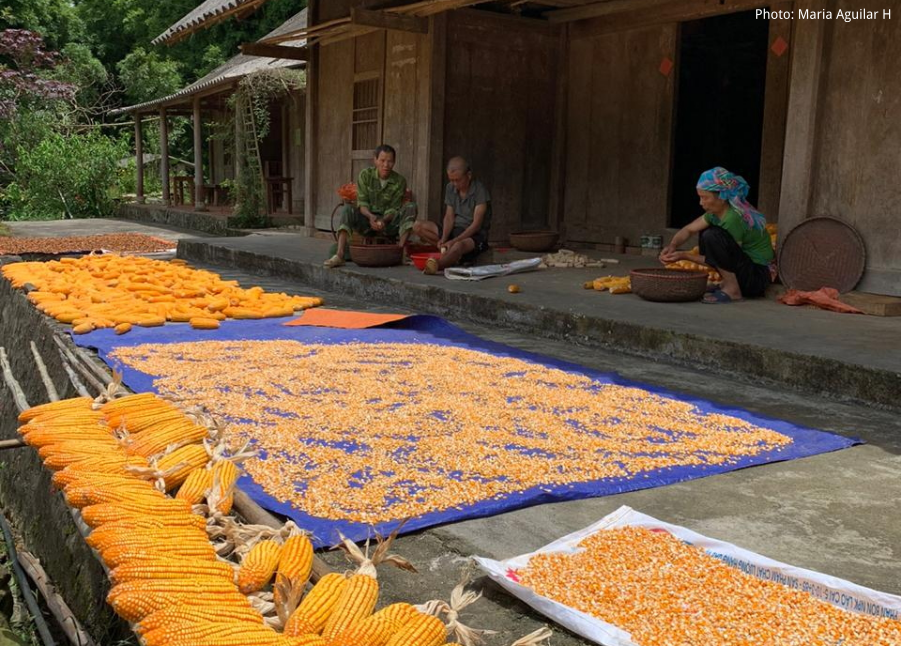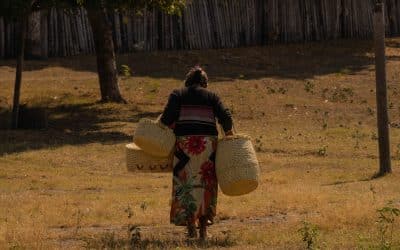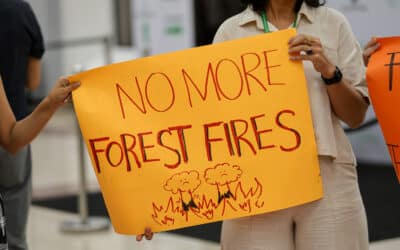Originally published by 50by40
To commemorate World Food Day, the Global Forest Coalition (GFC) reflects on the impacts of extensive agro-industrial production around the world and community responses to the global challenge of COVID-19. These reflections are based on a series of webinars that GFC led in April and May (you can join our next webinar series here), where peasant and Indigenous leaders, pastoralists and activists shared their perspectives and experiences on how industrial livestock farming and the pandemic are affecting their communities.
The key threats to local food sovereignty discussed during the webinars were the increasing demand for industrial meat and dairy production, mega-monocultures to produce animal feed, political instabilities exacerbated by the pandemic and the continued lack of recognition of women’s rights.
However, traditional practices and new rights-based initiatives are also lighting the way towards transformational change in our food systems. Examples from around the world show that sustainable alternatives with human and animal well-being at their centre are not only possible, but also vital to tackling the global health, climate and biodiversity crises.
Lessons from COVID-19 can lead the way to sustainable food systems
by Milena Bernal, Global Forest Coalition*
During the first months of the global COVID-19 outbreak the Global Forest Coalition organized a series of webinars to reflect on the struggles that many rural communities across the globe are facing as a result of industrial meat and dairy production. The webinars brought together Indigenous leaders, pastoralists, peasant farmers and campaigners, and examined the impacts that the pandemic is having on the lives of small-scale producers. To commemorate World Food Day today, we bring you insights from the webinars and share stories of resilient alternatives to industrial agriculture.
Although the COVID-19 crisis represents a real threat to traditional agro-pastoral systems, the structural problems associated with extensive agro-industrial production continue to be the greatest threat. These unsustainable and export-oriented production models are a result of an ever-increasing demand for meat and dairy and international trade agreements that transport meat and dairy with little care for its true cost. [1] They have caused severe damage to the world’s forests and vast carbon emissions, as well as the violation of Indigenous and rural communities’ rights (especially for women), land grabbing, violence, hunger and poverty. Animal welfare has also been sacrificed in the industry’s relentless pursuit of profit.
The practices of pastoralism and transhumance [2] have been present in human history for millennia, but now more than ever, they are under threat. In southern Africa, for example, rural pre-colonial farming communities responded to social and environmental changes with innovation. [3] However, after generations of exploitation, farmers there have largely lost their traditional livestock and agricultural roots. Further north, in countries such as Mali, Burkina Faso, Niger and Chad in the Central Sahel, traditional practices are more common, but they have been seriously affected by recent political instabilities exacerbated by the pandemic. [4]
Industrial livestock production is increasingly displacing traditional crops and small-scale livestock farming. In Paraguay, intensive commodity farming of meat and genetically-modified animal feed crops occupies 95% of land suitable for agriculture in the country. [5] Nowhere is safe from the encroachment of industrial agriculture, including national parks, where agribusiness and real estate speculation go hand-in-hand. [6] In Brazil and Colombia, Indigenous Peoples and local communities have also been displaced [7] or literally surrounded by genetically modified soy and other monocultures, causing local food crises. [8]
The corporate capture of decision-making pits agribusiness against small-scale producers. For example, the Pakistan’s government recently issued an order barring the sale of unpasteurized and unpackaged milk in one of its main cities, citing a lack of hygiene in milk production by small farmers. This represents a significant risk to the livelihoods of small-scale producers, many of whom are women, and keeps milk production in the hands of big companies such as Cargill, Nestlé and FrieslandCampina. These companies are already investing heavily in the sector to increase livestock and dairy production substantially. [9] Discrimination against small-scale producers is also seen in Kenya, where farmers are being criminalized due to pressure from Nestlé, which argues that they are a public health risk. [10] In other countries such as Kyrgyzstan, COVID-19 has caused closures and checkpoints that affect not only food security in urban areas, but also the sale of merchandise produced by pastoralists. [11]
A historical lack of recognition of women’s rights to land and their vital roles in food production and conservation compounds the impacts of both industrial agriculture and the pandemic in many countries like Kenya [12] and Pakistan. [13] In the latter, rural women spend almost half of their work time caring for livestock, but their land rights are not respected, mainly because the livestock trade is dominated by men.
Despite the particular challenges women face, their resilience is important: in Argentina, even though millions of hectares of forests and wetlands have been deforested for mega-monocultures of soy, [14] rural women still guarantee food supplies for the whole family through small-scale livestock farming. [15] Whilst much of Africa stopped during COVID-19 lockdowns, women in Narok, West Pokot and Marsabit counties in Kenya continued their reforestation and agriculture work for family sustenance.
Across the world, community responses to the COVID-19 crisis have shown the resilience of traditional farming practices. This has included strategies such as Agaman in the Philippines, the method of storing food to ensure its supply and equal distribution. Agroecology in peasant farming groups in Brazil and solidarity among pastoral peoples in Argentina have made communities less reliant on easily disrupted commodity supply chains and more able to feed themselves in times of crisis. An initiative by the Good Food Fund and other NGOs to create the Food Council of China has brought together concerns over animal welfare, human health and nutrition, and the impacts of food production and transportation. The forum of small organic producers in Shashe, Zimbabwe, [16] has allowed hundreds of small farmers to guarantee their food security without affecting forests and biodiversity.
Valuing and preserving traditional knowledge is now seen as key to overcoming the COVID-19 crisis in terms of the impacts on public health and livelihoods. There are good examples of how similar challenges have been faced in the past. In Ethiopia, where 20% of the population are pastoralists that graze their livestock across 60% of the country (even affected protected areas), traditional knowledge has helped communities overcome anthrax outbreaks among livestock that can be deadly to humans. [17] In the case of the Pygmy Indigenous Peoples in DRC, traditional livestock practices have allowed them to obtain small incomes from the sale of their produce, supporting their sustainable diets, women’s livelihoods and efforts to promote community-led reforestation. [18]
The replacement of traditional practices with an export-oriented industrial livestock model is only possible with strong government support and foreign investment. For the future of the planet, these subsidies and incentives must be stopped and redirected towards sustainable alternatives. International development banks are at the heart of the expansion of industrial meat production, so what better way to celebrate World Food Day than taking action against this? We invite you to sign a petition calling on the European Bank for Reconstruction and Development and the World Bank to stop investing in industrial animal agriculture and redirect financing to the alternatives described throughout this article.
* Milena is the Global Forest Coalition’s new livestock campaigner and works to halt forest loss and community impacts caused by industrial meat and dairy production.
[1] Hall & Malig. Global Forest Coalition. (2016). What’s at steak? The real cost of meat. Impacts of the industrial livestock and feedstock industries on forests, climate change, farmers and communities
[2] Nomadic pastoralism or seasonally shifting livestock grazing.
[3] Boa, M (May 2020). African/regional webinar. GFC. https://globalforestcoalition.org/livestock-webinar-series/
[4] Bayazene, M (May 2020). African/regional webinar. En GFC. https://globalforestcoalition.org/livestock-webinar-series/.
[5] Vicente, C. (April 2020). LAC/regional webinar. GFC. https://globalforestcoalition.org/livestock-webinar-series/
[6] Lovera, M (April 2020). LAC/regional webinar. GFC. https://globalforestcoalition.org/livestock-webinar-series/
[7] Gómez, M. M (April 2020). LAC/regional webinar. GFC. https://globalforestcoalition.org/livestock-webinar-series/
[8] Aguiar, D. (April 2020). LAC/regional webinar. GFC. https://globalforestcoalition.org/livestock-webinar-series/
[9] Sayeed, A. (April 2020) Asia-Pacific/regional webinar. GFC. https://globalforestcoalition.org/livestock-webinar-series/.
[10] Monjane. B. (May 2020) African/regional webinar. GFC. https://globalforestcoalition.org/livestock-webinar-series/
[11] Maratova.E.(April 2020) Asia-Pacific/regional webinar. GFC. https://globalforestcoalition.org/livestock-webinar-series/.
[12] Mulenkei, L. (May 2020). African/regional webinar. GFC. https://globalforestcoalition.org/livestock-webinar-series/
[13] Sayeed, A. (April 2020) Asia-Pacific/regional webinar. GFC. https://globalforestcoalition.org/livestock-webinar-series/.
[14] Global Forest Coalition. (2020) Impactos de las plantaciones de monocultivos en las mujeres (Cobertura forestal 62). https://globalforestcoalition.org/es/forest-cover-62/
[14] Alvarez, M. (April 2020). LAC/regional webinar. GFC. https://globalforestcoalition.org/livestock-webinar-series/
[15] Shashe is a village in Zimbabwe that leads agroecology emancipation exercises. Communities have benefited from the agrarian reform program by making use of shared plots for the production of a variety of food crops, livestock (cows, sheep, goats, etc.) and the use of traditional seeds.
[16] Tefera, Z. (May 2020) African/regional webinar. GFC. https://globalforestcoalition.org/livestock-webinar-series/
[17] Diel, M. (May 2020) African/regional webinar. GFC. https://globalforestcoalition.org/livestock-webinar-series/




